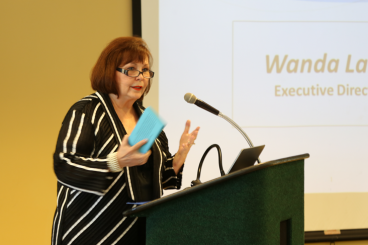In the Jan. 8 issue of The Alabama Baptist, a series of articles was featured on the topic of mental illness issues. These articles explained that mental illness is a legitimate medical condition the Church needs to recognize, talk about and seek to minister to (visit www.thealabamabaptist.org and search “mental illness”).
Reading the articles struck a chord with Leanne Messer, business development coordinator at Brookdale Senior Living in Birmingham. “[The articles] just really inspired me,” she said, prompting her to hold a luncheon titled, “Dealing with Mental Illness in the Church” on April 21.
Inspirational lunch
“We’re always looking to be a solution for the people we work with so we thought that would be a good inspirational lunch and arm [participants] with the information they need to help their members when they are struggling with mental illness,” Messer said.
Messer brought in Wanda Laird, executive director of the National Alliance on Mental Illness (NAMI) of Alabama, to educate participants and supply resources to guide those navigating the unfamiliar waters of mental illness. NAMI is a nationwide alliance for families and friends of individuals with mental illness that provides support, education and information to aid in the understanding and treatment of mental illnesses. Programs it offers include support groups, training programs and peer-to-peer courses taught by trained NAMI mentors.
Laird agreed with the idea reported in the Jan. 8 package — education and honesty are vital to treating and helping those who struggle with mental illnesses.
“The more open discussions occur, the sooner we will break down the stigma and encourage individuals to find the help that they need for recovery,” said Laird, whose husband, Donald, is pastor of First Baptist Church, Titus.
As she was sharing the facts and figures about NAMI and mental illness, Laird’s passion for the subject was obvious. And the source for that passion brings her life’s work into a new focus.
“I have a nephew who was diagnosed with autism and that drew my interest to the field of mental health,” she said. “He is now 17 and just the light of our lives — we call him our hero.”
Finding help
But in order for NAMI to fully help people throughout the state, people have to be educated about more than just the illnesses — they have to know where to go to find help.
Although it was established in 1979 and has been in Alabama since 1986, “NAMI is still unknown on a national basis,” Laird said. “We’re wanting to make a difference wherever we are,” she said, which is why intimate educational lunches like Brookdale’s are important.
In order to help the 1 in 4 adults and 1 in 10 children who suffer from mental illnesses, “we must educate, educate, educate as much as we can and help provide support,” Laird added.
Laird closed the luncheon with the words of former first lady Rosalynn Carter, “If we ignore their cries for help, we will be continuing to participate in the anguish from which those cries for help come.”
To learn more about NAMI and to find helpful resources, visit www.namialabama.org.
________________________________________________
Tips for positive interactions with those suffering from mental illness
Do:
- Remain calm
- Be respectful and helpful
- Speak simply and briefly
- Move slowly
- Indicate a willingness to understand
- Be aware of body language
Don’t:
- Give rapid orders
- Shout
- Move suddenly
- Maintain direct eye contact
- Express anger or irritation
- Try to change the person’s beliefs






Share with others: